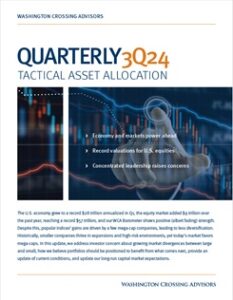Greece’s Troubles
Greece’s troubles enter a new and uncharted phase this morning, as Greek negotiators abandoned talks this weekend with creditors and, instead, called for a July 5 referendum where the Greek people will vote on whether they agree with the latest proposal by creditors (which actually no longer exists). Greece’s creditors rejected Greece’s request for an extension of the current loan program, which means that the Greek government will not have access to a remaining 16 billion Euros of additional funding. Consequently, the Greek government will most likely miss a €1.5 billion Euro payment due to the International Monetary Fund (IMF) tomorrow.
For the Greek people, life just became more difficult. Yesterday, it was announced that banks would be closed and capital controls would be imposed. Withdrawal limits for depositors, mandatory bank closures, and restrictions on movements of funds into and out of the country will push the economy deeper into recession. The Greek banking system will most likely lose access to emergency funds provided by the European Central Bank (ECB). All of this will make for a very tense environment as the Greek people move toward the proposed referendum this coming weekend and will influence the outcome of the referendum. A clear “yes” vote by the people would send a message to creditors that Greeks are willing to make concessions in order to preserve their standing in the European Union (EU). If the Greek people do not signal a clear “yes” vote to the referendum, then the process toward an eventual Greek exit from the European Union would most likely begin.
While very early in the process, we do not see signs of contagion. While Greek credit default swaps (CDS) and bond yields are surging, other European peripheral nations’ CDS and bonds (Italy, Spain, Portugal) are exhibiting only modest amounts of stress. So far, fears of contagion to other country’s economies and financial systems appear contained.
In the days ahead, expect to see a run on Greek banks, growing civil unrest, and increased perception in the media that Greece may exit the Euro area. Greece appears ready to miss a €1.5 billion Euro payment to the IMF on Tuesday, which will mean that Greece will likely be cut off from further IMF assistance. At the same time, the European Central Bank should also restrict assistance to Greek banks via the ECB’s emergency liquidity assistance facility, further increasing the likelihood that banks will be unable to meet depositors’ demands for cash.
In addition, on July 20 and August 20, the Greek government needs to redeem €3.5 billion and €3.2 billion in bonds, respectively, with payments due to the ECB. If those payments are missed, then Greek banks would become cut off from the ECB and would likely be insolvent. Greek debt held by other banks and creditors will fall in value as perception of default rises. Additional haircuts may be applied to Greek debt for use as collateral among banks, resulting in some tightening of credit conditions. As all of this unfolds, and the referendum nears, depositors will likely become less patient and more anxious to take their remaining €130 billion Euros out of Greek banks and out of Greece, in general. Consequently, the Greek government will be under great pressure to tighten capital controls.
There are strong incentives in many quarters to have this issue resolved quickly, however, and the consequences as outlined above are harsh for Greece. A “yes” referendum this weekend could possibly set the stage for renewed negotiations with creditors and help calm an otherwise very difficult situation. In addition to prospects for a deep recession and social strife, Greece remains a part of NATO and there is a cost of isolating Greece politically or further moving Greece toward ties with Russia. The European Union, European Central Bank, and the International Monetary Fund have all expressed a desire to find a compromise that would keep Greece part of the European Union and most Greeks express a desire to remain part of the European Union.
As for asset allocation portfolios, we remain underweight equities and overweight U.S. dollar exposure versus our benchmark.



